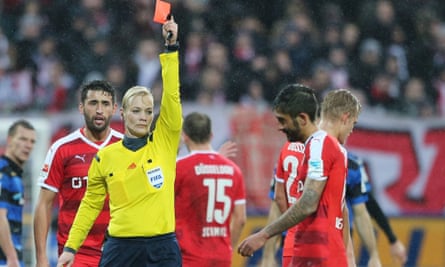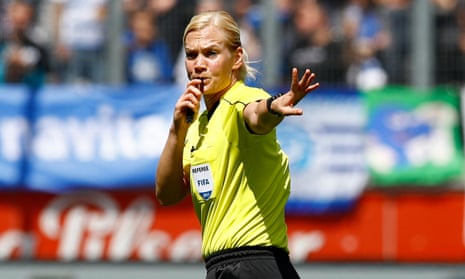The appointment of a woman as a top-flight referee in Germany has been hailed as a breakthrough for equality domestically and a milestone for football.
Bibiana Steinhaus has become an overnight celebrity since the announcement by the German football federation’s referee commission that she will take charge of games in the Bundesliga next season. The same organisation banned women from playing football as recently as the 1950s.
Writing in Die Welt, columnist Oskar Beck said that until now almost every element of the game was male, even the definite article “der”, which is used to describe everything from kick-off to goalpost, counterattack and corner kick. Fittingly, he said, “whistle” – “die Pfeife” – is feminine.
Steinhaus would change the tone of the game for the better, Beck added.
Another columnist said Steinhaus’s appointment ranked in importance with the country getting its first female chancellor in 2005.
The 38-year-old, from Bad Lauterberg in northern Germany, works as a police officer in Hannover, and is known as “Bibi”. She said the job “has always been my dream. That it should come true has obviously made me extremely happy.”

Steinhaus told the DFB website: “For any referee, whether man or woman, it is the biggest ambition to be able to blow the whistle in the Bundesliga. I’ve spent many years working towards that and faced several setbacks. Which is why I’m very happy about the trust the referee commission has shown in me, which proves that even in refereeing it’s performance that counts”.
Inspired by her father who was also a football referee, Steinhaus took charge of her first match in 1995. She was promoted to the women’s Bundesliga in 1999 and to the women’s regional league in 2001. In 2005, she was recognised by the international football body Fifa, becoming a referee for the second tier of the Bundesliga in 2007. She refereed key women’s football matches at the London Olympics in 2012.
Her partner, the ex-Premier League and World Cup referee Howard Webb, said he was “absolutely thrilled to bits” by Steinhaus’s appointment. Webb told the BBC he thought it might inspire more women to aim for high positions in the game, and could pave the way for the Premier League to put women in charge of matches.
“We have some good female officials in England. More and more are coming through and if they have the ability it shouldn’t make any difference if they are male or female,” he said.
Until now the leading woman in German football has been Sylvia Neid, the former player and coach of Germany’s highly successful women’s team. Martina Voss, who won seven national titles as a player and trains the Swiss women’s team, has suggested it might not be long before a woman takes over as a Bundesliga coach.
Steinhaus is the oldest of four new referees appointed for the coming season. Insiders said it was her last chance to be promoted to the Bundesliga.
In 2014, while serving as the fourth official in a match between Bayern Munich and Mönchengladbach, the Bayern Munich coach Pep Guardiola stormed up to her to put his arms around her shoulder as he argued about a refereeing decision. She angrily shrugged him off, and it was he who faced criticism for his patronising behaviour.

Steinhaus was at the heart of another media storm in 2015 when Fortuna Düsseldorf’s midfielder Kerem Demirbay received a five-game ban for saying “women have no place in men’s football” after Steinhaus sent him off.
